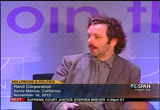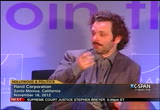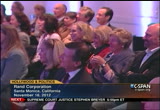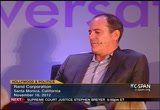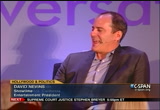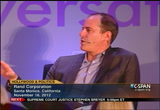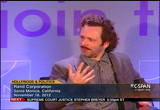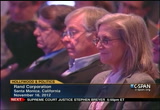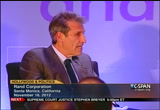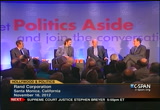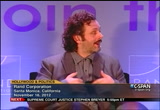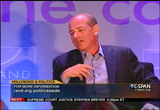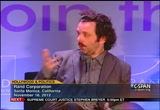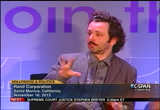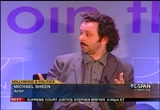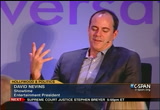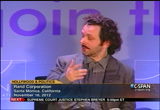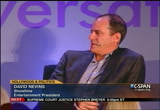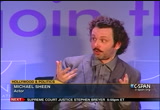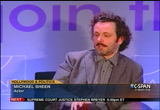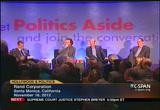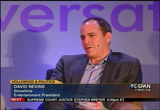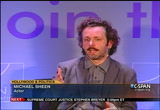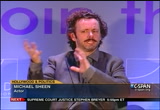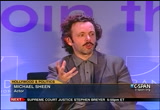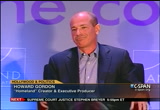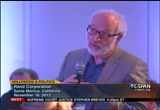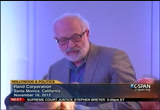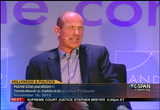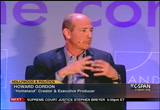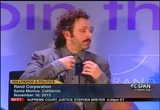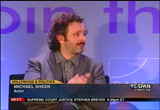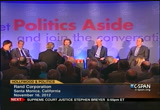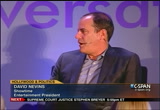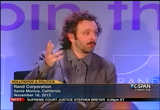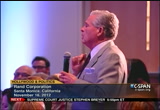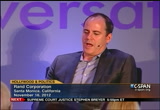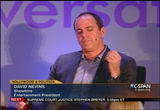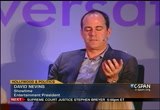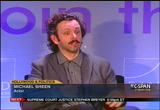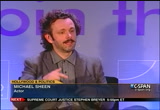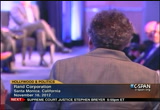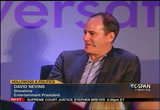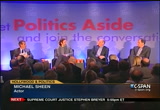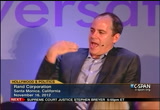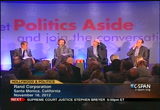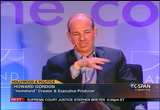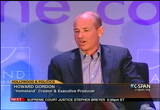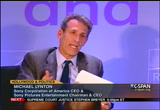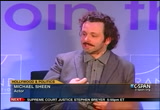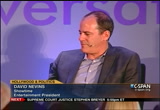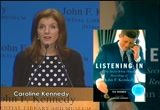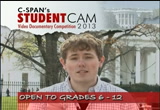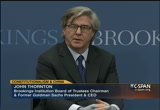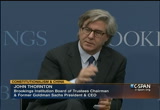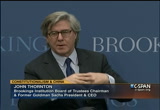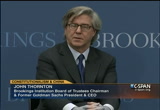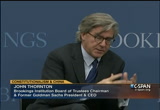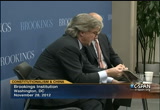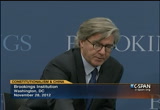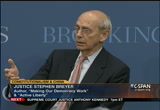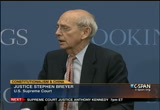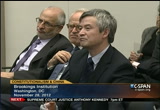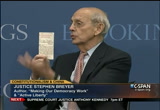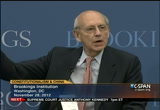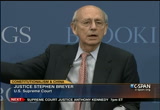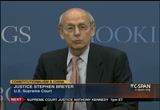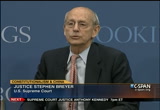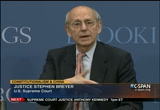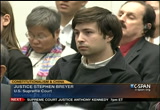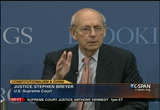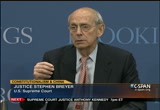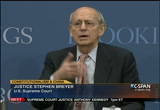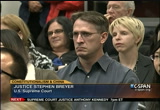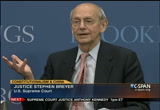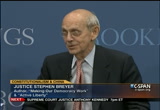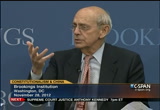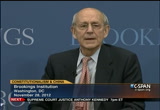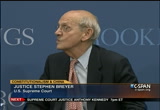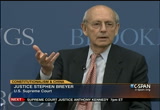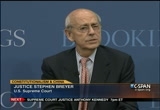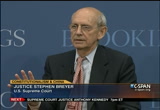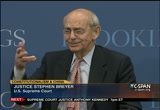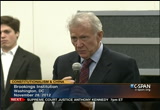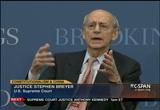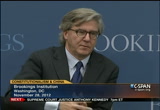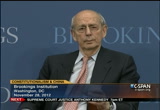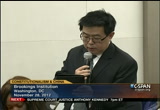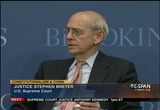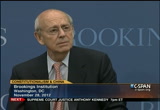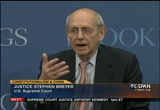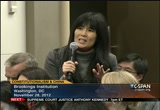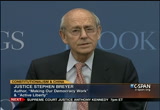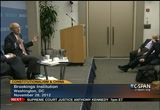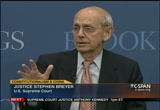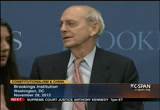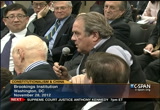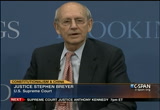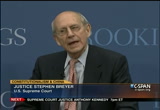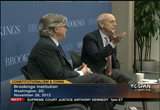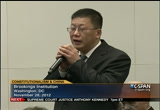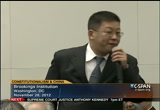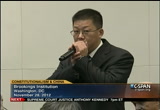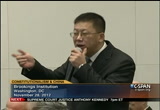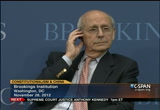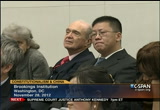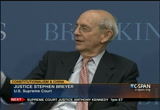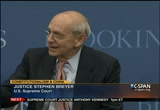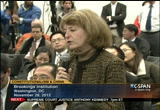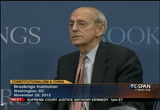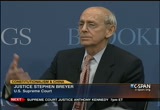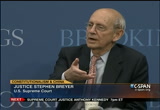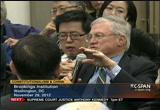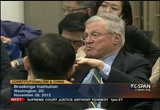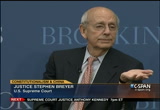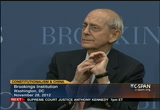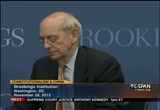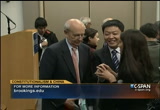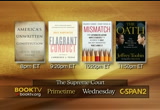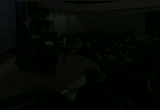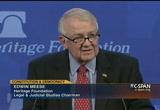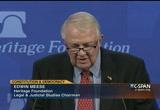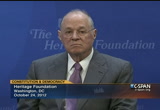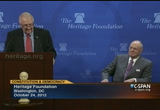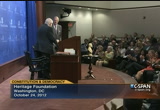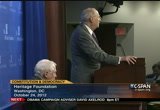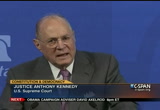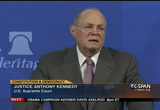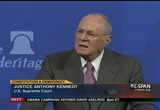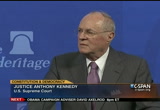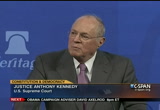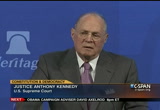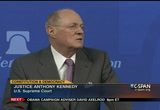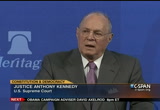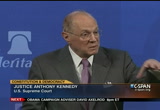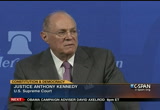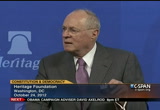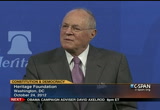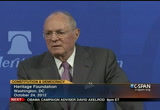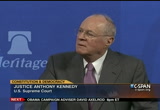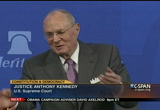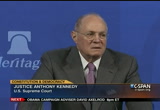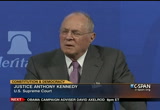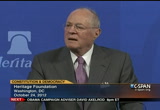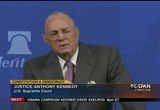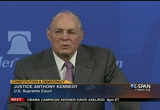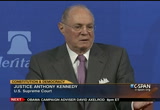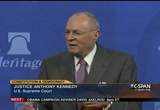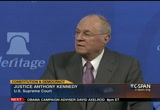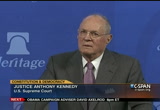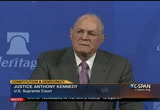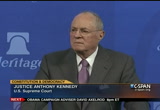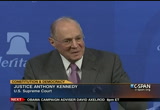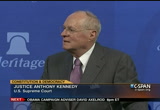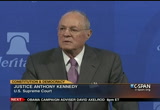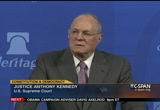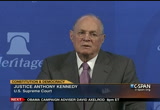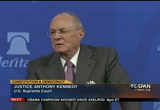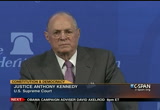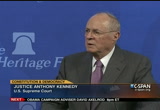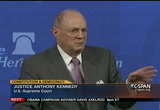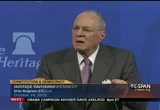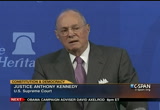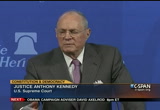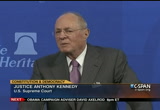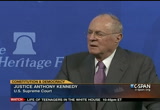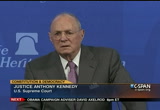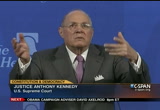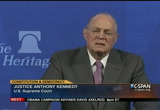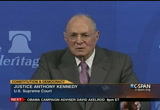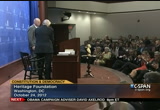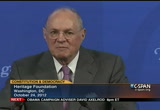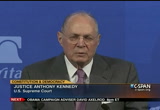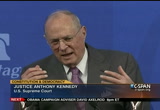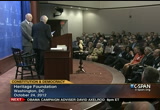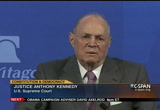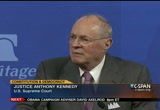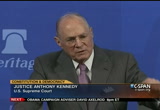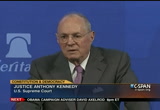tv Public Affairs CSPAN December 25, 2012 5:00pm-8:00pm EST
5:00 pm
with. the idea a man has put four nuke bombs on american soil, how far do you go to get it out of him? what are the lines you're prepared to go up to or beyond in order to save the entire united states of america or everyone in it or do you have to negotiate with this man's human rights? so the film was a dramatization of that. and again very difficult to read what the politics of it were. you can watch the entire film and again everyone has their own view of it and being the man who -- actually the film is about a c.i.a. agent who is working in iraq disappears and nobody knows where he is. he hops up in a mall in america and gives himself up and when he's brought in he says that he's converted to become a muslim and has put these bombs around the place.
5:01 pm
then sam jackson's character comes in and using torture and the whole film is about me being tortured by sam jackson and pushing you to see how far everybody concerned is prepared to go to get the information out of him. it was an incredibly difficult film to make for me. i remember one of the first days of the torture thing which is is something where i was chained to the ceiling and hosed down with water with fans blowing on me. and i said how are we going to do this and they said we're going to do it but not for very long. that set up a precedent for the hole film. that was a very frightening thing to go through. a point you brought up which is the idea that people's desire to be involved in helping the
5:02 pm
imaging of this completely depends on what they believe is how they are being portrayed in it. and that gets very complicated. >> it's a public they report they are trying to not to get in trouble. there are agencies who are better or less. >> i think mueller believed in the idea which he sort of watched the c.s.i. effect. c.s.i. created more interest in people going into coronaries forensic seasons and that college programs couldn't go fast enough to put people through and he had watched that and realized as the f.b.i., wanted to make being an f.b.i.
5:03 pm
agent cool. that was a recruiting vehicle. that was his interest. and john miller who ran public affairs with him for a long time and was a high ranking public affairs guy and had come out of television and has gone back to television and understood it. and even with the best of intentions, there was enormous tension the whole way through. if we're going to do modern television people are going to watch there are going to have to be character flaws, there was conversation over drinking and smoking and sex and what kind of sex and where and when and how. and they had the best of intentions and i was direct with them going in. and i would say that was the best experience. >> but ultimately the show didn't work. >> it wasn't quite original
5:04 pm
enough. and as crazy as kerri mathison as she is, as psychologically damaged. i do believe that kerri mathison makes the c.i.a. sexy. it makes it a sexy place to work and interesting place to work and i bet it would net a -- despite all of her personal problems and i think somebody should ask that question of the c.i.a. what has happened in the last six months of their recruiting. >> they realize this but it would be hard for any government agent to say i'm going to support a buy polar agent who is sleeping with an as lamb i can radical. >> in some ways it highlights those things more in terms of one person.
5:05 pm
through the whole journey of frost nixon, his relationship which garn in a small theater in london, then broadway, then a movie. the very first preview performance of frost nixon in a theater in london, the entire back row was lawyers, the third preview david there was having been given the all clear or told you should go see it yourself and he was shaken by it to begin w. for a man who is incredibly generous and warm and positive and supportive of everything, i think he felt very confused by how he should react to this. and as the whole thing went on as it started to become clear this was going to be a massive hit in terms of the play and the theater version of it, he started to get behind it
5:06 pm
because he's a very good business man and he started to go, well, okay, there is a certain amount of this i don't believe actually happened and is not true and we have someone in the audience who knows a lot more about it but i think he made a judgment call which was and i think this is the same with the agencies whoever is working on it and who is being represented, are we going to get more good, he was never going to be able to control how he was portrayed in it and i'm sure if the f.b.i. and c.i.a. and military could control it, i'm sure they would. but it's a give and take. the difficult thing from an autistic point of view, how much -- from an artistic point of view, how much are you being compromised in the story you want to tell. what was interesting for us at one point that david famously
5:07 pm
had gone to the premiere of a film that he was a producer of the night before he did his interview with nixon and he was criticized about it. on the premiere of frost nixon he was interviewing blair the next day. he interviewed blair and managed to get out of that on the admission that the iraq war was a disaster that nobody got. he learned something. that is an interesting give and take with the whole thing. >> so we heard this afternoon or this morning from a senior saudi arabian television official that he felt television programming through the 70's and 1980's had a positive effect on diplomacy. how do you think the world
5:08 pm
outside viewing shows like "homeland" and "24," have you heard anything at all? >> "24" and "homeland" are popular not just in germany and u.k. but in jordan and turkey. "24" is a huge hit in iran. --s beamed in illegally by you're not getting paid for it? >> no. but i do think. >> but it's smuggled in a lot. the actor is persian and has a lot of connections in iran and he's been tracking "homeland" in iran.
5:09 pm
>> it is stunningly popular but i've read a few criticisms of the show and to the extent that we make piss people off on every side of the aisle and are embraced by them too is a good thing. one thing i did learn is that as an export, as a public face, we do have some responsibility, some influence on -- this is an american export and we are good at this. we make really good movies and television shows. it is what the world sees of us. and there was a book by a researcher at the gallop organization and they polled people in egypt what is your feeling about americans. i don't like america but i like americans. and a very small percentage had
5:10 pm
never met an american. and they said how dow know and the answer was "friends". >> based on that i like america too. [laughter] >> politics demonizes and culture humanizes and you create some essential truth about tony blair. you have to love him at some point. >> this is an important thing in the case of the things i've been involved in which are based on real people and real events, in the case of "homeland" and "24" it's not based on actual things that have happened but the responsibility of how you portray this kind of thing. >> i'm quite annoying to howard because i think i'm the one person connected to "homeland"
5:11 pm
who grew up in d.c. so i obsess on tine details like m street is not a one way street, it goes both ways. >> but on the details that aren't so specific. i think you get enough of those details right that people can buy into the show. barack obama is not watching the show because it's a brilliant portrayal of the c.i.a. it gets enough of the details what it feels like to be in those situations. i have no idea why i like the show -- >> i think it's less about the details. michael described it as it's not a palemic and i think audiences smell propaganda but if you can introduce the complexity of what they do. "24" was not about a good choice and bad choice but the
5:12 pm
better of two bad choices. if there was a formula of "24" that would have been it. and i think these people saw and president obama sees as well there is something about the presentation of the complexity of some of the things that people who are charged with these jobs have to deal with. writing it and imagining it makes me glad it's not my job just imagining how tough some of these decisions must be makes you grateful. >> the verse that we show in frost nixon "the queen" and that is how much responsibility you take with that, especially when art itself is working in metaphors. when people ask me about there is a pivot al scene in "frost
5:13 pm
nixon" which never happened. how could you show that because that is a pivotal moment in the piece. and the same with "the queen," that never happened. nixon did used to make phone calls and a part of his research would be times he was on heavy medication at time and would make phone calls at times he wouldn't remember. his staff were told if the president calls you during the middle of the night stay on the phone, he will eventually fall asleep you put down the phone and never mention it. if it was a ballet of frost nixon, is it a valuable argument to say frost never sached around nixon?
5:14 pm
it's not a documentary. so it's more about -- i think an audience response on a whole as to the complexity of something. that's a balancing act of the facts. i watched "argo" the other day and one of the things i was unclear about was the most exciting part of it was something that didn't actually happen. it's an interesting question to talk about it how much can an entertainment rely on things that didn't happen if it is supposed to be based on real events. that is something that with each piece i've been involved with you have to judge along the way. >> talk about your new piece. >> i will be working on a piece
5:15 pm
about masters and johnson which is about real people and real events. >> a piece about mouse and johnson which has not been done. -- about masters and johnson which, weirdly i think, has not been done. these conventions of how popular entertainment gets made. we do historical pieces but real 20th century figures, they are done in movies, but not done in series so of course a series over the course of however many episodes we end up making we'll take great liberties with historical record. but it will be an interesting -- >> my rule of thumb in terms of playing the individual characters is that as the process goes on, the more i find out about the character and
5:16 pm
the more research i do and totally immerse myself in their life i will start arguing with the director and say no he wouldn't do that and they say no michael it's a story. you're not doing a documentary, it's a story. and when i first come up against the script, i don't know enough at that point to say he didn't do that or this. i have to agree on trust and by gut instinct and as a start finding out more and more. i've found where it does depart from the factual record i still feel like it's portraying the spirit of it. and when people say not every fact is true that you somehow manage to get across something far more complex than if you just showed the facts. something was recently pitched
5:17 pm
to me about a very prominent public contemporary figures series and i didn't have the guts to do it. it felt somehow wrong to try to make a fictional thing. it's one thing to do. maybe that's the line. virginia johnson is alive, masters is not. but their moment of prominence is 1960's, 1970's, 1980's. but i felt uncomfortable doing a tv show based on real people where we were going to fictionalize their lives and not the control ability of a two-hour script and an ongoing script and making up episodes. i wonder if some day that wouldn't be an interesting thing to do, not just this
5:18 pm
satire of the white house that you get on saturday night live do -- >> not having to do with a major terrorist attack. >> to do the obama story while he's in office. >> which is what you did with tony blair. which it takes a lot of balls to do that. >> a film that was in development came to me about jack kennedy and i remember looking at it and it was very much exploring the area of the women and all that kind of stuff. and i was aware that this was such -- because you're now dealing with fact and mythology and dealing with the american psyche and what he represents and the darker side and what it could do and open up, i just thought this is too much for me. and also it has to be handled
5:19 pm
-- i didn't think that every brodget that's been around, i don't think anyone has been able to hand that will in a way i would feel comfortable getting involved in. because you are opening up a massive can of worms there and all the ramifications of it. and the idea of people in high ranking positions and adulterous affairs is still very current. and they would be something valid and exciting about getting involved in exploring that issue but you are starting to tinker with things that are -- you start to wake a dragon and if you don't feel like you have the machine in place to deal with that, then it's like -- it can the danger zone. i remember when i was at drama school and have you acting teachers who think they are qualified to psych analyzing their students.
5:20 pm
you're starting to mess with people's psyches and have you no power to do it. so i think you have to be careful when you're dealing with that type of subject matter. >> why don't we take a few questions from the audience. >> first, where do i apply for an extra for masters and johnson? >> you have to get naked pretty quickly. latch laugh >> now that we got the serious one out of the way. >> why sit offensive to do a film on masters and johnson but okay to make up a phone call on nixon and frost?
5:21 pm
>> where do you draw the line on making up things for entertainment purposes? >> i think the line is -- i don't mind messing with history, i don't mind intermenting history, creating -- i would feel uncomfortable messing with an individual or a group of individuals who making up stuff about them as it's happening. i think there is a distinction and i'm not sure it's a moral distinction but i think you are on shakier ground, sort of clowning somebody out or making up stories on an ongoing basis
5:22 pm
when somebody is still living and working. >> like i said, -- i'm going to speak on behalf of the peter morgan who wrote it but in creating drama you have to find both an entertaining powerful and distillation metaphor for something that stays true to the events and the people involved. so i feel like if you portray someone doing something that is totally out of character to them, that is clearly -- that's where i would draw the line. but in terms of peter coming up with that phone call event which allowed certain things about nixon to be able to come to the floor, certain things about frost to come to the floor, certain things they both
5:23 pm
did that there was no place for in this whole narrative, it brought things together in a way that didn't cross the line of responsibility of what you show and don't show and somehow it was able to make something more complex in a way. the actual events were in some ways less complex in that story and peter found a way to make it more complex and show a vulnerable about nixon and bound him and frost together, the idea of two people who see themselves as outsiders and see reflections of each other and see mirror images of each other, so it created this powerful, dramatic metaphor for something that didn't not happen if you see what i mean. that kind of thing happened and
5:24 pm
it just created a turning point in the film that the story needed at that point. and for me personally i didn't feel it crossed the line. but it is the one thing that i've been involved in, every film i've been involved in people go what, that didn't happen. and whose responsibility sit to find out the truth. i do think for a lot of people the pims we do and tv shows we do are as far as people are going to go in terms of what actually happened. it's not like you can't find out stuff. there is stuff everywhere. so if it causes people to say i'm going to find out more about this, that's great. i'm not sure how much. i don't know how much you can be blamed for well, i thought that was true and it's not. it's up to you to find that out, isn't it? >> particularly when you are
5:25 pm
dealing with some subjects that are incendiary. 80% of americans found out their medical details from "house." >> my throat hurts, what is that? >> but it is something i think every artist, writer, executive in this medium what is my responsibility to the truth and what is my moral legal responsibility? i think those are lines nobody draws but as long as you are asking the questions -- >> we've never asked that question. >> never. >> blair's wife is famously litigious, where you get sued the lawyers are on the phone all the time with all these things.
5:26 pm
>> i'm grateful you are clarified and said your limits. i want to tell you a story and ask you a question. somebody was at warner brothers at the time when "j.f.k." was being made. there was a shot warner brothers wouldn't release. that was right after the assassination in dallas they got to l.b.j. sitting in his office. the phone rings he picks up the phone and somebody says it's done and he hangs up the phone. i was telling that story and said it didn't appear until the film but a student from germany said i saw that scene in germany. if it's in the foreign version and not in the domestic version, i think that says
5:27 pm
things about americans that will not be easily scrubbed from any mind. make believe does make believe. i'd like your comment on that but i'd like an answer to this question, when a lot of people overseas see an american film in which torture is used unrepeated, if there were a case in which somebody felt in effect that i've seen it in american television, i believe it happens, i believe it's okay or they wouldn't show it on television and without license committed torture, would you feel any personal responsibility about that, how would you feel? >> just on the j.f.k. assassination thing. i just read one of stephen king's new books which is about the assassination and a man who has the ability to go back in
5:28 pm
time and tries to stop the assassination of j.f.k. does that mean we should put a thing on the front and say this didn't happen? at what point is it someone's responsibility to find out whether there is a backing up of that argument. it seems ridiculous when it's about time travel because there is no time travel yet. to a lot of people that would be absurd, where is that line? it's a gray area. >> i think the answer to somebody who will look at -- watch "24" and say see didn't i tell you americans are torture mongers.
5:29 pm
it goes to the old question of what is the effect, what's the cause and what's the effect of art and on public perception and behavior. would i personally feel responsible? i thought about it and i do think we all bear some responsibility but not complete responsibility. so somebody who doesn't have a critical capacity to turn on a television and realize this is fiction, this is not a representation, that people will read this as a reflection of american policy or of america is an unfortunate possibility and in some cases i'm sure only underscores preexisting beliefs in any opinion. but i think -- yeah, i don't know what to say except i've thought an awful lot about it
5:30 pm
and something like "24" was singled out for instance. i think it belongs to a long literature from dirty harry. people were protesting americans. people loved "dirty harry." there was this consequence of events. where is the line drawn? by putting masters and johnson are they going to say look at these shameless americans who are promoting wanting sexuality where do you draw the line? >> i feel my duty as an artist like i said right at the beginning, my ultimate responsibility to represent human beings who are three dimensional and are flawed and have gray areas. i have to feel like there isn't one -- i just find it
5:31 pm
artistically dull for something to be overly politicized. i don't feel like that about the truth. so the characters i portray hopefully i bring that to the character, there is good and bad. there is compromise. there are all kinds of difficult areas. i would also need to see that. it increases a kind of dignity and respect and understanding for the people involved. this is where i get into gray areas. you agree with his politics? it becomes very difficult. the more you get immersed, the more it is odd to see them as just a politician. the season as a father and husband and a son, because you have to. my personal responsibility would be to make sure the complexity
5:32 pm
5:33 pm
is emotionally untrue. and a lie about lbj been a co- conspirator in the death of jfk. the same thing, the paranoid theories about fdr being behind pearl harbor. i'm trying to find the roots to this paranoia. i do not like to see paranoia perpetuated. >> i agree. the idea of showing lbj on the phone -- it is an artistic failure more than anything else. >> there are questions of taste. is that an interesting artistic choice? is it cheesy? we all face those choices all the time. michael faces those decisions. do i believe it represents some truth? do i think it is cheesy or false? >> there are certain things
5:34 pm
that decrease the complexity. the lbj it decreases the complexities. it simplifies it in a way that is banal and uninteresting. i think that answers both sides of it. from a factual point of view, i see no evidence to back that up. someone could do a film about the theories of 9/11. i guess someone is allowed to make a film about the most ridiculous ideas about 9/11. it would be difficult to do that in a way that was compelling. it would artistically be a failure, i would imagine. if someone can make a brilliant
5:35 pm
portrayal of the most ridiculous theories about 9/11, i would be amazed. >> over here. >> [inaudible] what was portrayed on the news was the truth. we all deal with that with their own children. i look at the question of the world. in america, the criteria [inaudible] what do we already know? that is one standard. we are putting things out into the world. there are many people -- everything that is portrayed about america is the truth.
5:36 pm
huge damage can be done in the world -- there are unintended consequences. huge damage can be done. i do not know how you put it into your arithmetic, into your calculus. >> some people are more thoughtful than others. some artists are more thoughtful than others. i am not the artist. i am one of the gatekeepers. it is something i think about. you areweighing a lot of different things.
5:37 pm
i do believe that in television, in my experience, the good stuff wins. when i have had success, it was something that was interesting and provocative. people are more and more literate. it translates beyond america. it is hard to answer for jack bauer and how he handles a difficult situation as a sole representative of how an american deals with somebody in who has a piece of information. it is a very hard thing to
5:38 pm
answer. that is a problem with literacy. that is a problem with education. there is an inevitable path of increasing sophistication, the amount of information that people can process and the amount of narrative complexity that people can process. it is on an increasing curve. >> i know you are an optimist. >> i am optimistic. look at television in 1968 versus or television is today. look at what the cbs evening newscast from 1974 versus what is happening today. it has become more politicized. the ability to process information has grown. these are issues of education.
5:39 pm
>> [inaudible] >> right. it is now more obvious. >> there is ongoing battle globally. people are putting out ideas. various ways, hidden or not, and value systems for these arguments. that is going on all the time. every single person involved on whatever level in our industry is putting something out there. obviously, you have to take responsibility for it. you try to work out exactly -- you join in a battle. someone else is saying probably the opposite. you have to get in there and do
5:40 pm
it. other people will not stop and you have to do battle with them. my own feeling is anything that opens up, creates more complexity, because it stops people from coming away from it with a black-and-white argument. i am very proud of it. people have totally different interpretations, depending on what their point of view is. it puts the emphasis back on them. it allows the space to allow people to say, i will find out more about that. there is something confusing about complexity. >> there is a question over here. >> i have one comment and two
5:41 pm
questions. m street is one way. in georgetown. [laughter] >> m street is one way. that was the wrong example. [laughter] >> we will not be held accountable. >> it eventually got right in the script. >> you made me think, that is what is important. >> thank you. >> you talked a lot about your interpretation of past history. it is my hunch that "24" affected the future of history by presenting an admirable black president. i would like to know what you
5:42 pm
think. i have my second question -- [laughter] where did michael buy his socks? [laughter] >> that was my question. >> they were a present. from someone with incredible taste. they are british. >> i find it ironic that the notion of that black president, although he was just a presidential candidate in season 1, was created by a republican that probably was not thinking he was paving the way for barack obama.
5:43 pm
[laughter] you make interesting choices. there are weird outcomes. >> he has a picture in his office -- it is president obama looking this way. and then there is a portrait of david palmer. >> build it, and they will come. if you create the concept of something that was not there before, it creates the possibility. that is the extraordinary power of art. >> president obama and david palmer came from the same ether. it became far more interesting
5:44 pm
than some white-haired old dude. it did represent fictionally what barack obama represented factually. the best of what america could be. having only emancipated slaves 100 and something years before could put as its chief executive of black man. it was better drama. >> it was a very deliberate choice. it was a story telling choice. >> it was a more interesting choice. >> trying to create stakes. the assassination would be a national catastrophe. the first african american with a chance for the white house. that is where the choice came
5:45 pm
from. >> last question. yes? >> [inaudible] i want to circle back about what you said about the saudi ambassador. you've already discussed with you think about. what control does you have over the show's going there and being translated, and maybe not the dialogue that you intended? how does that work? according to him, this is a huge influence in how we are viewed. >> it is a distribution -- what
5:46 pm
control do we have in terms of distribution? >> [inaudible] >> she is asking an artistic question. >> i sent fox has some monitoring. -- i assume fox has a monitoring. >> that is not the question you are asking. >> it is the same. it is either subtitled or dubbed. >> thank you. >> we are doing "24" in india. the fictional prime minister of the country he was a bollywood star. he is playing jack bauer.
5:47 pm
i do think there is a great opportunity for cultural diplomacy not withstanding the hazard that a show like "24" might have had. there is a tremendous power and responsibility. it is good that those of us to do this and create the content are mindful that we have that power. it is easy to get isolated in los angeles. it is a little bit of a twinkie defense to say that it is just a television show. i cannot think that is a valid point of view to have as a creative artist. >> as the moderator, i will make one comment. i grew up in the netherlands. there are 19 political parties.
5:48 pm
they used to buy time. interestingly, in the mid- 1970's, the show's the labor party showed was "all in the family." because they wanted everyone in holland to believe that archie bunker was the typical american. the more conservative party showed "m.a.s.h." the winter show there was an inherent anti-war sentiment in the united states and there were a lot of people that work empathetic with those clauses in holland. you can never really understand how it is going to be manipulated by local agendas and parties. that was my experience. let me ask a last question. aside from things that you have been directly involved with, is there a film or documentary or
5:49 pm
television show which you think is a great example of what hollywood can mean to public policy and politics? is there a singular documentary film, television show, which stands out to you? >> "mr. smith goes to washington." no matter what your politics are, i cannot imagine anyone watching that film not being somehow moved to have a voice. to be able to put a voice to experience and your point of view. i suppose that gets me every time. >> good choice. >> mine was "it's a wonderful
5:50 pm
life." it was a snapshot of an imagined america. but maybe in america that was also at its best. to the extent that was a window to the rest of the world, people at their best. >> david? >> my reaction was "saturday night live." [laughter] i love politics, i love the sport of politics. i find it fascinating. between saturday night live in jon stewart, -- and jon
5:51 pm
stewart,i like satire. >> i am going to cheat and say "12 angry men." >> all of holland came to a stop at 7:00 on monday night. peyton place. >> really? >> thank you very much. [captioning performed by national captioning institute] [captions copyright national cable satellite corp. 2012] >> coming up on c-span -- talks about the judicial system with supreme court justices stephen briar and anthony kennedy. and then david axelrod talks about his career in politics. >> it seems the only people who knew for certain of the taping was my father, the secretary, and the secret service agent who inspired it -- to install the. that is until president nixon made white house taping famous and infamous and other presidential recording systems
5:52 pm
were revealed. against the backdrop of watergate, the concept of secret taping can seem problematic, but it is beyond doubt that these are a unique and invaluable historical resource. tapes unfold in real time in the most dramatic possible way. we hear the tense confrontations of the civil rights movement and the life and death decisions been made during the cuban missile crisis. >> caroline kennedy and a discussion on the 1962 recordings of the late president in the oval office. as we continue to the holiday on c-span2. >> as president obama begins his second term in office, what are the most important issues to consider for 2013? >> make a short message for the president. >> joined the student can competition -- student cam
5:53 pm
competition. for more information go to studentcam.org. >> supreme court justice stephen breyer was recently at the brookings institution to talk about his new book. he also discussed china and the history of the u.s. constitution. this is just over an hour. >> ok. concepts. for 20 years i have been advising -- roughly half of that on financial economic matters. the other half a variety of topics. about 10 years ago, um we started -- about 10 years ago, we started talking about role of law. i said to him at the time, what strikes me about this topic was that other than the occasion i
5:54 pm
can think of, other than when paul worked at the state department and bill clinton was president, this topic in my view has never gotten the attention it deserves. it has been treated too much as a technical topic. not as a fundamental topic about the relations of the state's. in my experience, i always say the chinese leadership, the most distinctive characteristic is they are systematically opened. that is to say the modus operandi is on a particular topic, let's look for the best ideas throughout the world, bring them back, study them, and then customize them as appropriate for our own system. and yet in this one respect, they have been a little bit slow. we had this conversation 10 years ago. now, i will stick my neck out
5:55 pm
and say for a variety of reasons, some of which are circumstantial, some of which have to do with the leadership in the standing committee come i believe that this topic will have to become an a more important topic. and that will be treated as all things are in china, top down. the truth is, fundamentals are not going to change unless there is a top down decision. so, in addition to that, i remember having a conversation with one of the current seven two years ago in which he made the following remark. one of the problems with modern politicians as they think in china we do what ever we want to do. we have to be increasingly responsive to the people.
5:56 pm
social media is making it so. the truth is the leadership in china keeps very close tabs on what is going on with ordinary people and the extent to which ordinary people are having their own grievances adjudicated in some more systematic fashion. this will create a kind of implicit pressure which will lead the top down leadership to have to deal with these things more directly. if that is correct, to extend the analogy, it will be absolutely essential that there will be some number of the very same people engaged with the senior leadership on these topics for a period of time, recognizing that the contribution of outsiders can only be modest. it can be profound, but modest only in terms of what actually happens. the chinese leadership -- they
5:57 pm
do not need help on the concepts. the conceptual understanding they have down just fine. what they need is extremely practical, concrete advice. if you want to go from here to there, how do we do it? give me specific steps to take. give me a sequence for those steps. what do you do? otherwise you have a wasted conversation. i say that, but there are people that are much closer to the subject matter thinking along those lines. so, as far as i am concerned, that is where this is headed. and that is one reason why i would like to see the brookings institution raise this to a much higher level of visibility. both justice breyer and i were guests at a dinner for hu
5:58 pm
jintao when he was here. and we talked about his book, which has been referred to by many people, "making democracy work." i said, by the way, will it be translated into chinese? the elections in this book are important for the chinese and i believe the chinese leadership would read this book. he said that they are in the middle of trying to do that right now. and sure enough, the book sold very well in china. and justice breyer went to china in june. he was very well received, talking about his book, including what i thought was a wonderful moment of poetic justice. on the cover here -- as you all know, here he is as the cover
5:59 pm
story. and that is interesting. what i find even more interesting is the date of this magazine is june 4. so, i thought to myself -- that might have been lost on the editor. so, it has thrilled me know wind that someone as imminent as justice breyer has become increasingly engaged on this topic. when we were talking earlier, he talked about during the conversation. and i said, "trust me, i am going to drag you into this thing every step of the way." if you ever lose your day job, you could be a permanent diplomat. we are very pleased to have him here today. where i would like to start is, i would like you to talk a little bit about your book and its relevance to the chinese
6:00 pm
situation, some sense of how all that was received? >> i knew how it was received. my relation to china -- i went with a professor who went to china. the press said -- what are you doing? >> i said i am writing a book. there are about 600 of them and they speak english. it is like talking to a group in texas. there is no problem in understanding how the system works. exactly what they said. how do we get from here to there?
6:01 pm
to which my response is, i do not know. that is a problem for you to solve, i cannot do it. what is it that they seem to be interested in? it is so obvious. do you think this rule of law has been given on day one and suddenly it was followed? of course not. do not think democracy will solve them. it is both your friend and your enemies. hamilton and madison right the document. it is a very good document. ask any of us on the courts, we would be in agreement on the basic things. the basic framework is it
6:02 pm
creates institutions of democracy. people can decide for themselves what kinds of community they want it is a special kind of democracy. it is a democracy that protect certain basic human rights that assures some degree of equality. the separation of powers is not what you are looking for here. separation of powers -- he is very clear. the separation of powers is both vertical and it is also horizontal. the basic function is not to preserve a rule of law. it is to divide power into pockets. you prevent any group of people from being too powerful.
6:03 pm
that is the basic purpose. finally, a rule of law. you have a document that is trying to restore democratic institutions, protection of human rights, a degree of equality, separating power, and guaranteeing a rule of law. hamilton is the one who brings in the court. he is trying to answer a question. we have written a beautiful document. lead federalist 78. -- read federalist 78. we have created a beautiful document. if nobody follows the rules, these are the ground rules, and if no one is to say when somebody in the government strays outside the boundaries, we should hang it up in a
6:04 pm
museum. nonetheless, you get the point. somebody has to have the power to say when the others have gone too far. who should that be? the president is already too powerful. congress? wait a minute, they are experts in popularity. believe me, they know popularity. if they did not, they would not be where they are. this document gives the same rights and protections exactly to the least popular person in the united states as to the most popular. you're not going to get them to do it. that leaves the judges. if you read 78, it is not that he thought the judges were wonderful. he thought that was the best choice available. we will give them the power.
6:05 pm
who are they? we do not know. perfect. wonderful. peridots egomaniacs yet. -- they are not ego mary axe -- egomaniacs yet. they did not have the power of the purse and i do not have the power of the sword. wonderful. we give them to the power to declare what others are doing are contrary to the constitution. it then takes a long time, close to 200 years, before that power becomes effective. the thing is to study the history of slavery and segregation. why? it's so tempting to say, the united states is the child of the french enlightenment. read what he writes.
6:06 pm
he comes over here to study what democracy will be like in the future. i will tell you two things that will happen. big problems in the united states. the first is the indian. that will not be such a terrible problem because they will kill the mall. the second -- killed them all. the second is slavery. remember that there were large sections of the country or the natural state of things was not human rights. the natural state of things was slavery. and then racial segregation. that took a very long time and a civil war and 80 years of segregation before we began to deal with that problem. to me, you go back and let it
6:07 pm
one of these cases. look at the history of the cherokee indian case. the supreme court says the law says the northern georgia belongs to the cherokee indian tribe. the president of the united states says the supreme court made this decision now let it in force -- and force it. -- enforce it. go forward. the efforts that were made to desegregate after -- when holmes was on the courts, contrary to what the 15th amendment says. we cannot strike this down because nobody will do what we said. we are not unfamiliar with this kind of problem.
6:08 pm
what i usually say, because i believe it so much, i think a great day in the history of the law of the united states in respect to establishing a rule of law was the day when the nine black children in little rock were finally -- you have the case which arises out of little rock. little rock begins when a judge says, we mean it. the first year, what happened? nothing. the second year? nothing. the third year, they finally get around to doing something. put those nine children in the school. the governor of arkansas called in his militia. the congressmen down there, who was a moderate, they arrange a
6:09 pm
meeting with eisenhower. president eisenhower meets with the governor. the governor says, i will let him do it. i will integrate the school. the governor goes out of the room and tells the press the opposite. the president just me down like a sergeant -- the general dresses down a sgt. that is what happened. eisenhower has to say, what am i going to do? eisenhower says to the governor of south carolina, what do i do? the governor was a moderate and had resigned from the supreme court. if you send in troops into arkansas, you'll have to reoccupy the south. public opinion for human-rights was exactly the opposite. the attorney general says to eisenhower, you have to send in troops.
6:10 pm
and he did. he took paratroopers from the 131st airborne. it has to be popular. he took those thousand troops deliberately chosen because they were the heroes of world war ii. every american knew that at the time. they put them on the airplanes and may take those children and that picture went around the world. fabulous. the supreme court said, absolutely, you do this. the day after the supreme court said that, the governor closed the schools. there remained closed for about eight months. -- they remained close for about eight months. that was the beginning of freedom riders into the south. it was a whole movement. why am i telling you this? i did not see how you bring
6:11 pm
about the rule of law without making the rule of law popular. the people have to understand the virtue of its and that is tough because what it means is you will have institutions called the courts, which by definition are there to do things when they are unpopular. wow. wow. how do we bring about that kind of society? v. gore, theh most remarkable thing about that case, people follow did. no guns, no riots.
6:12 pm
i know what half of you were thinking. before you think that, you could turn on your television set and see what happens in countries that solve their problems that way. what i see every day and the court room is people who have somehow -- i do not know how -- part of the education -- partly education. i have read in this book, justice kennedy goes over to china lot. what would you say? we wrote down eight or nine. ultimately, what you're working towards is a general understanding.
6:13 pm
i found my own way of expressing that. of what that understanding has to be. maybe you can get their. -- get there. when i saw the apartheid in south africa, it meant something to me. i looked at the television and on the television, there is a woman, well dressed, well- educated woman, well spoken. she is black. she says the following. do you know what happens in this country? our situation is not normal. how did you get people to think that is normal to follow a rule of law and follow the judge's even when the judges decide
6:14 pm
something you think is wrong any the menendez unpopular? -- and wind -- and even when it is unpopular? the problem is put to me by those students at the university. you have to have an independent judiciary. how do you do that? tell them they cannot be fired. they will love that. and then you tell them we will not cut your pay. they will like that, too. i heard the russian judges speak about it thereafter. simple things.
6:15 pm
i did not know how you'd get them out of this -- as long as you have three people, the police chief, the prosecutor, and the judge deciding cases -- you could create a situation where the general public thinks that is abnormal. this is sort of weird. how do you bring that about? that is why you have to chapters in your book. the thing i like best about our bart is a lawyer will come in and say to a judge, judge, you are wrong. you are just wrong. they will say it politely. you are wrong. the judge will feel a little
6:16 pm
sheepish. if he will decide something so obviously wrong. and the press. i know the greatest test of the independent bar and prospered the press is always criticizing you and the bar is always telling you you are wrong. they are absolutely necessary. i agree with justice breyer. we should do something about the press and the bar. i said, no, that is not the point. the point is opposite. you cannot do without this press writing all kinds of things. unless you give the publicity to it, it there is no way to build -- all right, so, this is one. this is a dream, but it is the
6:17 pm
right train. -- dream. would democratic people takeover, they want to fire all the judges. everyone knew fire, everyone you fire, you are weakening of the independent judiciary link. the good ones think, i could be fired, too. i found south africa very interesting. look and see how they dealt with their judiciary's there. they put in new judges, but they did not fire the old ones. i find it instructive. that was one. the best things in the administrative procedure is a very simple rule.
6:18 pm
if it is not public, it is not a lot. ok? simple. when the judge is going to say -- that is a very simple and very important role and it comes under the guise of the administrative procedure. i do not know -- i put them in order of what you try to get first. i do not know. do not take this -- every legal procedure will be conducted in public. wait a minute. what about the judges or juries deliberating? the deliberations are not public. how do you run not? there is a rule there called
6:19 pm
expert take communication. -- ex partee communication. all the evidence has to be public. the deliberations can be private. this rule against, nothing goes then to the decision makers mind except to -- it is wonderful that it sounds technical. the more technical it sounds, the better. take the part about commercial law, for example. are you going to get the investments is people feel that their decisions will not be
6:20 pm
decided fairly? of course, you want businesses. you need a minimum due process. impartial decisionmaker, an opportunity to present arguments, and an opportunity to sit approves the arguments of the other side. we need those so that the businesses will see that their disputes are being resolved fairly. pretty soon, you have this independent judiciary going. once it is going, you say to the people in the government world, are you worried about being accused of business related crime? if you end up being accused unfairly of that, would like a fair and impartial tribunal?
6:21 pm
taken area that is not threatening a ne. habeus corpus, that should be higher up on the list. king john was asked by his -- here is all we want. do not affect a person's liberty negatively, except a -- negatively. nobody's liberty is affected without a law. the law has to be public. if you can get -- i had a case like that.
6:22 pm
somebody was picked up by the customs authority from dominican republic and put into confinement can throw iraq out the window with a note that said, send it to my wife -- and through a block out the window with a note that said, send it to my wife. what is your explanation? the explanation has to be according to law. and there we are. people tried to do their jobs. a public defender, that is helpful. then you build a core of people with a professional interest in seeing that the process remains. if you think they always succeed here, they do not. plenty of problems with our
6:23 pm
system. there are plenty. that is actually a virtue. by looking at these problem areas, they can see help people take steps to try to over comment. -- overcome it. >> i am going to open the floor because we have half an hour to go. >> [inaudible] >> in the back. >> thank you. "washington post." thank you for those remarks. you have taken us into a thorny territory. from your visits to china, and your conversations with students and officials, if you have a sense that we are on a path where an independent judiciary can be formed in a system that
6:24 pm
is ruled by communist party that puts other values much more on the supreme level down the once you are siding. do you have a sense the party is willing to make the kind of compromises that will put it out of business? >> you are asking the question i cannot answer. i do not know. i do know that you have an entire generation of students who were very much up to speed on this. they do see year-old law and the kind of values in our country -- a rule of law and the kind of values and our constitution as worthwhile and important. how do get from here to there? the battle becomes have one --
6:25 pm
6:26 pm
6:27 pm
6:28 pm
the first is whether china is a part of the global problems or part of the global solutions. it is not just chinese problem. >> you are getting beyond me. i can not see it as a china problem or an american problem. i can see it as a human problem. if you could find a way to have a society without conflicts, that should be what you do. ultimately, law and courts are ways of resolving conflicts among human beings. a good way to do that or people
6:29 pm
with simple tribes. they could solve their problems by having someone -- even then, they had problems. they would dispense justice individual by individual. and it worked. where you are dealing with groups of people, hundreds of millions of people, there are conflicts you cannot solve except through rules. once you have a system of rules, you have a system of law. as an issue have a system of law, people said, why should i do that? -- as soon as you have a system of law, people say, why should i do that? one kind of answer that seems to work pretty well it is that you had a say in this, you know. maybe it is second-hand, but you had a say. and then they say, the majority
6:30 pm
is ganging up on me. the people in power did not like me. very well, we will have a basic system that gives even knew certain basic rights. we have set up this imperfect system filled with problems. an imperfect system to help make certain you are not being unfairly picked on. unfairly picked john is not something that is an american notion -- picked on is not something that is an american notion or a chinese notion. justice shall you pursue, not dispense. the idea -- maybe i am wrong. i suspect there are certain things in human nature that are universal.
6:31 pm
having a say might be wind. not being unfairly picked john is certainly one. -- picked on is certainly one. that is why i think we are basically here. we're trying to find solutions . >> a woman in the back -- right there. >> i work for the national endowment for democracy. the west does not always here as often as some of us like.
6:32 pm
the number of human rights -- the starvation of tens of millions as well as a lot of other political campaigns. what are the limitations and solutions rule of law can provide for that problem? >> i think people would not vote. that is unlikely to occur. courts and judges and constitutions -- people see it as one possible, small guarantee against the kinds of course that
6:33 pm
happened -- horrors that happened all over the world. you put nine people together with the system of education and tried to get -- try to make it public and maybe it is a little bit of help. that is where i think we are. the strength as having a notion that i will accept this court decision even though i do not like those judges and i think fit are wrong half the time. i will not even tell you what the lawyers say when they're outside the courtroom. it may help a little bit. maybe there is a guarantee of a kind of -- it could be swept away pretty easily.
6:34 pm
we keep working at it. in china, they just have a police chief and prosecutor and judge. what kind of a system is that? and then i think, 98 -- 95% of a cases are decided by a plea bargain between the prosecutor and the defense lawyer. and i said, what kind of a system is that? it is not a perfect system. there are criticisms of our system. there are problems. the important thing for us, i think, is keep working on them.
6:35 pm
your job is to go participate and take part. if you do not like it, it convinced the majority to go your way. if you do not like what is going on, there are legal aid societies. go into a courtroom. it is a messy system. it is not terribly efficient. hamilton and the others hoped it would be a kind of guarantee for certain basic liberties. i believe in that or would not spend so much time added. yes? >> thank you. i write the mitchell report. as i was listening to the
6:36 pm
beginning of this conversation, i was reminded of a wonderful conversation that took place probably 30 years ago between bill moyers and a former justice talking about the constitution. this question goes to what is at the heart of constitutionalism and the rule of law. in the course of that conversation, after a long discussion about constitutionalism, black man turns to moyers and says it is really the preamble that breathes life into the constitution. i wonder where it -- whether that is a point of view that you hold and whether you think it has relevance. >> the preamble, we, the people
6:37 pm
of the united states. i used to be able to quote it. i do not think i can now. the preamble is important. we, the people. but it is not the only thing. i had a very interesting conversation in china. i have gone there twice. the first time was a few years ago. i went to beijing and then we went to shanghai. in shanghai, whereas to meet with a group of businessmen. these businessmen had all been involved in the dot.coms and had lost a lot of money. most of them had made a lot back. i was fascinated. one of them said, i prefer the cultural revolution. then you knew the government was the enemy.
6:38 pm
now you are not sure. i said, you'll want to bring about a democratic system. after they say how much -- it is a very interesting point. i favorites. i have noticed that there are millions of people in china who make a few dollars a day and they are not a very rich. you have quite a lot of money, i gather. suppose they all say, we are in the majority. you have this money. we're going to take it all away from you. the one who started it said, are you in favor of that? i am in favor of democracy, but maybe not right now. [laughter] it is like a tiger by detail. you start looking at the other side and they are afraid of a
6:39 pm
certain kind of chaos or a certain kind of -- somehow, that is partly -- that fear is partly, but not completely, dampened by the parts of the constitution that guarantees rights. they cannot just take it away from you. it is a need to find ways of taking the fierce of different people -- fears of different people. i heard this last night not npr. in egypt, they're trying to write a constitution. the liberals walked out. she told the liberals, and do not stay out of the ram.
6:40 pm
6:41 pm
america in english. china does not have freedom of the press. i am a lawyer in china. i will do one year of administrative lawsuit and then another year of commerce law. americans can hardly imagine our situation. years ago, i followed the government's rules. i was mentally kind of ignorant. at that time, my perspectives
6:42 pm
told me it was correct to support our system. history told us america's imperialists invaded china. when i heard that part of the story, i was so angry. after i studied law and i entered law school, i learned maybe your system is the best. let me say right now, i am someone who except universal values now.
6:43 pm
as an individual. however, we know there are 1.3 billion people in china. how many folks can reach this level? it is not that easy. for those people who still don't understand law and have not accepted universal values, how to make them understand what is law and what is rule of law? why should he meant to deal with each other in this way? -- humans deal with each other
6:44 pm
6:45 pm
>> keep doing what you are doing. keep doing it. sandra o'connor, one of my colleagues, feels very strongly about the fact that teenagers and high-school students are not learning civics. they do not know how the government of the united states works. she's been a lot of for time trying to develop programs on computers, television, that you can send into the classrooms. none of us thinks the rule of law is the american system in its entirety. we think the fact that people will apply and follow a rule of law is one thing that we think
6:46 pm
-- i think -- and is a national treasure. it is a treasure that has developed over many, many, many years with many setbacks along the way. in my and mind, there is no way of maintaining it without teaching the next generation, the generation after that. that means teaching. it does not mean propaganda. it means giving them a chance to discuss these things, to understand how the system works, to participate. we would have a day called youth in government today. everybody in the class would get to go in shadow down -- shattered one of the board of supervisors. -- shadow one of the board of
6:47 pm
supervisors. i remember that. one of the reasons -- one of the things i thought in architecture in australia, they built a parliament. this parliament goes up like this. the building goes down almost to the ground and it is covered with grass. but the children -- the children would go to the top and they would roll down to the bottom. the association in their mind would be this democratic government of australia and has a place where i can go rolled down the hill. it will make them more interested. i am pointing out there is no simple technique. ultimately, it does depend on building support for this idea.
6:48 pm
6:49 pm
the chinese people also have experienced a lot of difficult famous, including being jailed and beaten and thrown out of the legal profession. in our own country, lawyers and people have experienced a lot of pain in the civil rights movement. what would be -- what would be a way to avoid these calamitous events and bring about the rule of law? >> we will not fire you. they might be willing to do that. if they did that, the judges would love it.
6:50 pm
nobody else would like it. but maybe they would do it. we have an administrative law rule. let's have all of the court proceedings on television. the proceedings. not the deliberations. let's have the trials and all those things. maybe they would do that. what about the arbitration system? you are now paying them so much and you are not firing them. why don't we do it according to prepublished rules? there are so many things. you do not have to do everything at once. she sent us a film from china,
6:51 pm
which we looked at. it was a school, fifth graders. the fifth graders had suggested to the government -- they did a film than it is absolutely priceless. the parents -- they did not know how to do it. they would make this mistake or that mistake and it would have its comical elements. they got interested. they ended up electing a monitor. i do not know how good the monitor was. there are ways, i think, which you are more likely to think of then i am. taking these ideas and saying, try it out over here and try it out over there. you are building the bar. none of these things --
6:52 pm
everything has its drawbacks. >> as the gentleman right here. >> thank you. i have been involved in studying and practicing chinese law for the past 45 years. justice breyer talked about changing the legal culture in china. i wanted to mention one incremental kind of improvement that does not come from the top. i was at a meeting last year to discuss administrative law reform. we were told that central government still does not want to pass a nationwide administrative procedure act. one was drafted in 2003 and it was rejected because it was too much of the professors law because the drafters looked very hard at the american procedure.
6:53 pm
that has been lying around, as have a draft of the administrative skill litigation lot. the leadership has -- i was very interested to learn that two provinces have developed regulations. i heard the mayor of a fairly large city talk about what he had learned as a mayor. he had been a central government official before and he realized once you got there, a central government officials do not understand a lives of ordinary people. and then he had to watch the proceedings and the process of drafting the local administrative procedure regulation and he came to understand the importance of procedural justice. that was one of the first times in 35 or 40 years of going to
6:54 pm
china that i heard a chinese talk about procedural justice. the term is in the vocabulary. i think local experimentation may have the least helped in the increment the building of the change of legal culture. >> that is supposed to be one of the virtues of one of the american federal systems. the laboratories of the experiment. one problem with having the population of 1.3 billion, it is a large population. one virtue is that you can divided into provinces and you can have real experiments. try this over here and try that over there. that is a tremendous virtue. i read in your book, you have the confusion tradition and that is what -- that is that morality
6:55 pm
is important, and not necessarily the law. of course, morality is important. how do you create a system that is moral? in today's world, with televisions and computers and everybody working hard all the time, maybe you cannot. all these things you can experiment. that is such a plus. >> final question. >> [inaudible] >> microphone. >> i am a chinese lawyer.
6:56 pm
if the case comes to the supreme how do you interpret the case? if the decision is a four-four, what do do? >> if it is 4-4, there is a rule on that. usually, all nine participate. if one person were disqualified, if it splits 4-4, the lower court decision is automatically affirmed. >> thank you. >> i want to make one minutes of closing remarks by thanking all of you for coming. thank you for your wonderful
6:57 pm
6:58 pm
>> each night this week c-span 2 will be featuring book tv programs. tomorrow night, books about the supreme court starting at 8:00 eastern, yale law professor amar talks of justice thomas. and then carpenter on the case lawrence v. texas struck down state sodomy laws as unconstitutional. then on sunday, the taylors on affirmative action and on tuesday, jeffrey toobin on how the supreme court decisions affected other decisions. all this week on c-span 2. >> i like the variety of the shows, the programs on c-span and the debates. i like to catch those when
6:59 pm
they're available on c-span. i do watch the political call-in programs as well to get the various positions from republicans, independents, democrats to see what folks are thinking around the country. >> i think it's fair and impartial. and i think it's full -- it's a full spectrum of what the political scene is. and i like the coverage. >> dennis dorsey watches c-span on comcast. c-span, created by america's cable companies in 1979, brought to you as a public service by your television provider. [applause] >> speaking at the heritage foundation, supreme court justice anthony kennedy submitted it's the duty of every american, not just public servants, to defend the constitution. he talked about the importance
7:00 pm
of teaching constitution in public schools. justice kennedy joined the supreme court in 1988. this is an hour. >> thank you, ladies and gentlemen. it's great for me to be able to join john in welcoming you here to this joseph story lecture. this is the fifth annual occasion on which we've had this lecture. as i'm sure you all know, the heritage foundation's vision is to build an america where freedom, opportunity, prosperity, and civil society flourish. to help achieve this vision, the senator -- center for judicial and legal studies launched the preserve the constitution series which is an annual lecture series to inform and educate citizens on topics related to the constitution and the rule of law. to preserve the constitution series premotors the protection of individual liberty, property rights, free enterprise, the constitutional limits on bofment. and -- on government. we've been able to feature some
7:01 pm
of the nation's most respected judges, legal scholars, lawyers, and policy analysts. the marquee event in this series is tonight's program, the joseph story distinguished lecture. the namesake of tonight's lecture, joseph story, became the youngest associate justice ever to serve on the united states supreme court when he was appointed by president madison in 1812. justice story made a significant mark on american law in his 33 years on the bench, but his greatest contribution to the jurisprudence is his renowned commentaries on the constitution. eminently quotable, justice story famously and correctly declared, quote, a constitution of government is addressed to the common sense of the people and never was designed for trials of logical skill or visionary speculation, unquote. this lecture series celebrates justice story's legacy in the law.
7:02 pm
prior joseph story lectures have been in judge robert bork, professor john harrison at the university virginia school of law. judge raymond randolph for the court of appeals for the d.c. circuit and last year justice batch elder for the united states court of appeals for the sixth circuit. tonight we're honored to add a fifth name to the prestigious list as we welcome justice anthony kennedy who will deliver this evening's joseph story distinguished lecture on the topic the constitution and its promise. justice kennedy received his bachelor of arts degree from stanford university and the london school of economics, and then his law degree from harvard law school. prior to his public service, the justice served in private practice in both san francisco and sacramento. i can attest to his prowess as an attorney because on one very interesting occasion, he represented me. [laughter]
7:03 pm
>> on a speeding ticket. [laughter] >> and got me off with a minimum fine. from 1965 to 1988, justice kennedy was a professor of constitutional law at the mcgeorge school of law, the university of the pacific located in sacramento. and a point of particular pride of mine is the fact that he provided valuable support to then governor ronald reagan on a number of legal issues as a volunteer lawyer. justice kennedy was appointed to the united states court of appeals for the ninth circuit in 1975 where he served for more than 12 years until president reagan nominated him as an associate justice of the u.s. supreme court. he took his current seat in 1988. in nominating justice kennedy to the supreme court in 1987, president reagan remarked that his career as a judge in the u.s. court of appeals for the ninth circuit, as a constitutional law professor,
7:04 pm
and in private practice was marked by a devotion for the simple, straightforward, and enduring principle that we're a government of laws, not of men. during his more than three decades on the bench, justice kennedy has played an integral role in the consideration and decision of some of the most significant cases and some of the most serious constitutional challenges in our nation's history. he's been a staunch defender of first amendment rights, individual liberty against government intrusion, and federalism. these are core themes of our preserve the constitutional series, and we're honored to have the justice here at heritage to provide this evening's lecture. please join me in welcoming the honorable anthony kennedy. [applause] >> thank you.
7:05 pm
thank you very much. good afternoon, ladies and gentlemen, and my fellow citizens. in a nation that must seek always to come ever closer to the idea and the reality of the rule of law. and it is a special privilege and pleasure to be introduced by my long time and valued friend, ed neese. ed came to sacramento in the late 1960's. at that time, there was still in state government a continuing expanse tradition that public service was a high calling. that public service was an honor and a trust and a duty. in my early years in sacramento, even in elementary and high school, i had the good fortune to meet leaders of the state of california, the heads
7:06 pm
of executive departments, any number of them were brilliant attorneys. and they appreciated the fact that civil service is a public trust. the whole idea of democracy is that each generation is the trustee for the next. each generation has the obligation to ensure that democracy is stronger for the next generation than it is for our own. each generation has a duty to conserve and to preserve and then to transmit the assets of a democracy. and trustees don't grab all the assets for themselves. ed neese was squarely within that tradition. he considered public service to be a great honor.
7:07 pm
and it is again my pleasure, ed, to be with you this afternoon because you were the idea of a dedicated public servant. and your work continues here at heritage for which i congratulate you. the heritage of freedom is fragile, and it must be transmitted from one generation to the next. and that's the purpose of the heritage foundation, remarkable institution which exemplifies one of the strong voices that a pluralistic and independent and principled society can produce. the heritage of our freedom is, of course, closely tied to the constitution of the united states. the heritage of liberty is bound up in the constitution of
7:08 pm
the united states. now, some of you may be thinking, it's pretty good. he's talked for three minutes and he's him worked his way into the constitution. here we are. [laughter] >> but americans talk always about the constitution and there's a reason for that. the constitution gives us our identity. the constitution gives us ourselves identity, ourselves authentication, our self-esteem, defines our purpose, defines our mission, it defines who we are as a people. we come from many ethnicities, nationalities, religions, and yet we are bound together as one people because of our allegiance and our respect and our reverence for the
7:09 pm
constitution, and this is a link, a tie, a bond to our history and to our heritage. that is unique or almost unique in the world. this tie that we have to our constitution that defines us gives us stability and a purpose and a mission to our people. and it is the envy of the rest of the world. the british revere their constitution as well. not quite the same. william gladstone, prime minister of england, at one time talked -- compared the american and thening lish -- the english constitution. he began by saying the english
7:10 pm
constitution was grown, the american substitution was something that was made. if you ended there, you might have thought it was rather patronizing, the english constitution was made and the american constitution, made. he went on to refer to the american constitution in the most laudatory an complementary of terms. he said in that same statement, just as the british constitution is the most shuttle organism ever -- sussle organism to proceed from the womb and long process of history, so the american constitution, the single most wonderful work ever struck off at a given time from the brain and purpose of man. this was a highly laudatory,
7:11 pm
complimentary statement about the american constitution. and it's hard to find superlatives for the work that the framers did in philadelphia in 1787. there's a book by katherine drinker bowen which i have mixed ideas about because it is filled with conversations that never could have happened. [laughter] >> but the title is "miracle at philadelphia." and that's not far wrong. washington, of course, was the presiding officer of the convention. and this was providential. the american constitution was by accident and design and i think by providence. the delegates sometimes -- the first month, they didn't know, would there be a president?
7:12 pm
would it be a council? would the president have an absolute veto? at the end of the month, none of these things were resolved. at some point the delegates would say the 18th century equivalent of we're out of here. but washington would say, but general, please stay. and you didn't walk out on the general. and they stayed for three months and finished this document. one of the great if's in history is what if jefferson had been at philadelphia? it's interesting that two of america's greatest thinkers, greatest writers, john adams and thomas jefferson were not at philadelphia. adams was the american minister to the court of st. james. jefferson, the american
7:13 pm
minister to paris. and neither of them were there. now, jefferson made a tremendous contribution. he, from paris, sent to his friend madison over 200 books on political theory, political thought, history, and i wasn't able to verify it but my surmise is that some of those books must have been about the dutch federation, which was very instructive for madison and the delegates when they were thinking of federalalism and mom eskew -- and monesque for separation of powers. jefferson was not there but did get his hands on a copy very quickly of the constitution. we emailed him a copy over there in paris. and he looked at it and said,
7:14 pm
well, where is the bill of rights? and the answer was, there is no bill of rights. he said how can you have a constitution without a bill of rights? he said every people on earth is entitled by nature to a bill of rights that protects them against their government. of this foreshadowed a problem, no bill of rights. george mason was one of the members of the virginia delegation. he had written the declaration of -- rights for the state of virginia in 1776 and actually was a few months before jefferson wrote the declaration of independence and jefferson relied for inspiration and substance on mason's declaration of rights for the state of virginia. and when the convention was
7:15 pm
over, mason, who was a member of the virginia delegation would not sign the constitution. washington was infuriated. but this indicated a real problem. because if you didn't -- the constitution went into force when nine states ratified. if you didn't have virginia or new york, it wouldn't work. so it came about one of the great informal agreements in american legal history, there was an agreement, an informal agreement, that if the constitution were ratified as written bit 1787 convention, that there would be a bill of rights. and the statesmen, and there were statesmen in those days, kept their word so we had a bill of rights in 1791.
7:16 pm
and the result is we have a hamiltonian structure and jeffersonian bill of rights. and let me mention a few things about each of those. insofar as structure, they are different structures but one of the principal ones is separation of powers and checks and balances. we use those terms often interchangeably, separation of powers and checks and balances but they actually have a different thrust. separation of powers. teaches each brafrpbl of the government has a certain autonomy to act on its own. checks and balances works the other way around. checks and balances indicates the government cannot of course operate unless the branches
7:17 pm
interact with each other. there's a certain newtonian metaphor to checks and balances. the framers of the constitutional convention and the country, their countrymen, were children of the enlightenment. and it wasn't just jevers but -- jefferson but many of the framers and people at the time who were fascinated with all sorts of gears and balance wheels and clocks and pendulums and machines, and they could see this newtonian metaphor with checks and balances. two components of the congress must act in concert.
7:18 pm
and then congress then enacts, the president vetoes, the congress overrides the court's review and the courts reviews like a pendulum or a clock. and this metaphor captivated the american mind. the framers were not only good inventors, they were astute. learners of human behavior. and knew no matter how brilliant the written document was, it required a virtuous and enlightened citizenry in the words of that time, to ensure that the constitution would -- would survive. enlightenment was so powerful that towards the end of his life and a hundred years after
7:19 pm
newton was the most famous person in the world, he was not the only enlightenment thinker but was the poster boy for the enlightenment. the average person didn't read presepia math mat came, but the idea the apple fell out of the tree, there was a law of nature, a universal principle that the human mind of its own force could discover was liberating. the idea swept the world. and you know who became the successor to the mantle of newton? this was not a celebrity crazed era. but washington became the most admired person of the world. and there's a connection.
7:20 pm
washington wasn't the only the founder and great thinker but the poster boy for the american revolution. and there is a relation between the two. because the framers demonstrated that the human mind of its own power can discover and write the laws of a decent government. and the force, the separation of powers, and checks and balances had in the original constitution. you could have -- you do have whole constitutional law courses for a semester on structural mechanisms in the constitution. and this is just, what do they call it, drive-by discussion?
7:21 pm
but i should mention federalism is one of the other great structures. i won't gave a lecture to some patent attorneys and they're a difficult audience because you're trying to get their attention and they're sitting there doodling with quadratic equations and just as a prodantic device asked some of the structural him balances of separation of powers and federalism could have been a patentable invention if the framers applied for a patent. and i thought it would be maybe difficult for them with checks and balances because they red about it in monesque because he
7:22 pm
talked about legislative, judicial. it was a brilliant implementation. and in fact, if you look at article 1, the legislative power, and look at article 2, the style is completely different. article 1 sets out with great precision in section 8 the particular powers of the congress and what are the powers of the president? the sentences are longer, the style is different. you have to go through and in the middle of the sentence pick out the executive power and then he receives foreign ministers and he has the appointment powers, the commander in chief. and there's a reason for that. the framers weren't sure what this executive would look like but they were confident it should be washington and they trugsed him to -- trusted him
7:23 pm
to establish the tradition. so i didn't think that the checks and balances were exactly a breakthrough in the prior state-of-the-art that moss eskew -- that monesque had written about and you could see the reflection in england, permanent power in the monarch, property in the lords, numbers in the commons, an emerging independent judiciary. so i thought maybe not so easy to get a patent, even though i said it was a brilliant implementation. but federalism, clearly a unique contribution and in another place i said it was a unique contribution of the framers, a political theory. the framer had the idea you had more freedom if you have two governments instead of one, you almost get intellectual whiplash. why more freedom if you have
7:24 pm
two governments? 3 now, many students think of federalism as being a brilliant administrative device this was the biggest landmass since the roman empire to attempt a unified government and it took, what, six weeks to get from new england to south carolina. so if you're a businessperson or astute manager, you have territorial divisions in a certain sense. and in the 160's and 1970's when european states persons and scholars were looking at american federalism to see if they could find some lessons for the european union, many of
7:25 pm
them thought of the american federal system as being a administrative -- a device of administrative convenience. in a sense it was but that wasn't the whole theory of federalism. that's not the reason for two governments. the theory of federalism the genius of federalism is it's wrong as an ethical matter, wrong as a moral matter for you to delegate so much power over your own life to a remote central authority you can no longer plan your own destiny and the destiny of your children. that's the moral and the ethical underpinnings of federalism. those are the structural components, the hamiltonian
7:26 pm
structure and there's a jeffersonian bill of rights. and you hear the two things, you think there might be tension between the two. but actually, there's a stunning cinergy, structural components of the p federal constitution work quite well with the bill of rights. and again the bill of rights you can have not only a full constitutional law course on the bill of rights, and one on the first apartment, i'll mention the first amendment, the speech clause. and this whole idea of structure and substance is a device that breaks down because the first amendment in the way of structural, you can't have the government work unless you have free speech so it's structural in that sense and also is a substantive right. it's a right inherent in the human personality and human
7:27 pm
dignity. that you have the right of free expression and free worship. in thinking about the first amendment speech clause, it's hard for me to think without a blackboard or a chalk, but even it doesn't work because there are at least, at least three different rely himself for speech protection. and if i drew circles it would look like a target, but you would inevitably have to assign maybe a more central feature to one type of speech than another, and i don't think any one type of speech in the constitution is a priority over any others. so if you can think of a then graft, a then graft is on a screen and it shows these circles that move, and they overlap each other, but they're still all of them transparent and the circle keeps its
7:28 pm
360-degree integrity and you can see its component but circle in and out, sometimes one is on top of the other. if you think of a then graft, you can think after at least three components and the first is, of course, political speech. this is essential. to the human personality. it's essential to the american democracy. but there are many people that think, rightly so that there are other things in the world that are more important than politics. art, culture, religion, science, philosophy, sports. whether the empire got it right last week, didn't call it
7:29 pm
second base. whether or not the nature of dark matter will be first discovered by microphysicists rather than astrophysicists. it's all part of the speech and thought and belief that's protected by the first amendment. you can't think of it just in political terms. it's important. and there's a third dimension. speech is what allows you to define your persona, your personality. your speech, your thought, your beliefs or who you are. and this is an essential human right. now, the supreme court in its first amendment cases has protected speech.
7:30 pm
that is hideous. we only get those cases we had a case recently protecting speech, videos, where it was described to me, i never look at these things, women in spikes heels killing little animals. we protected the oath. it was protected speech. we protected speech when on the day of a funeral of a service man killed in the middle east, there were protesters using derogatory words about gays, saying the military is all going to be doomed to predition because it protects gays on the day of the funeral. the supreme court said that's all right.
7:31 pm
at first glance you then might think the court in its first apartment jurisprudence has adopted, embraced the philosophy of relativism, of moral relativism. all ideas are equal. who are we to say one idea is better than the other? now, if we were going to have a philosophical argument you could make a very strong case that the philosophy of moral relativism, that all ideas, all art, all speech is equally good, you would find it a very
7:32 pm
strong argument against that. relativism leads to skepticism and skepticism leads to cynicism and cynicism is corrosive of basic human values. so it's a philosophic decision of the first order to embrace the philosophy of relativism. how do you explain the supreme court cases? it's very simple. the supreme court is saying it is not for the government to decide this. the government does not take a position on which philosophy is correct, which philosophy is incorrect. this is for the people. but it doesn't mean the people
7:33 pm
can and shouldn't and should not. it doesn't mean the people cannot and should not and must not debate ideas to determine what is good and what is bad, what is right, what is wrong, what is virtuous, what is evil. now, those of us who taught in law school know that number one, law professors why skepticism, whatever the student says, the professor disagrees with, though it is skepticism. but that's just a method. it's not an end philosophy. it's just an order for you to think and understand and to identify first principles. but again, those of us who have taught know that any number of our young people are reluctant
7:34 pm
to embrace some ideas as good and some ideas that's bad. but please do not think that this is endorsed by the supreme court. it is the choice society makes. let me put it this way. you've been talking about the constitution with a b.c., you talk about the constitution of the united states you have a capital c. that's a document the framers hammered out with washington in 1787. it was ratified in 1789, the bill of rights was added in 178 , want to have checks and balances and federalism and is a document the lawyers argue about and judgments interpret. that's the big c constitution. the constitution with a small c is a word that's been used by historians and political
7:35 pm
theorists for centuries. constitution with a small c means the sum total of customs and traditions and morays and beliefs and historical harettage that -- heritage that define a people. constitution with a small c in this sense was used by some extent by players, certainly by air us to thele, paraclese, lock, russo, harrington, jacques maritan, michael olshaw. and the whole point of official free speech is that people can
7:36 pm
define their small c constitution so that their country has a meaning and a purpose and a history and a destiny. and it's the small c constitution that other people look to, that other countries look to to see what the united states is, what it stands for. now, if you have moral relativism as the public philosophy, you have a problem with teaching the importance of our heritage. you have a problem because teachers are reluctant to say that one's american hero was
7:37 pm
good and virtuous is important. but one event does not have an ethical and a spiritual quality . everything's the same. and the result is that young people are discouraged from finding magnificent examples in our history. they come across and relate in general terms without making any judgments. because if you say something important, that's an ethical judgment and you shouldn't do that. now, this puts us, in my view, at risk. you know, it's not just public servants that have the duty to preserve and protect and defend
7:38 pm
the constitution of the united states. all citizens have that duty. but this requires conscientious, conscious effort. you don't believe in freedom because you take a d.n.a. test. freedom is taught, and teaching is a conscious act. all of us have the duty to preserve, predict, and defend the constitution. but you cannot preserve what you do not commend. -- comprehend. you cannot protect what you cannot transmit. you cannot defend what you do not know. and this small c constitution at the heritage house and so many other distinguished groups
7:39 pm
in the american society contribute to must understand this. now, we live of course in an age of changing -- changing technology. but let me make two more points about young people. let me tell you two stories about poland. we were in poland i think eight years ago in september i was going to visit the supreme courts in poland. and when you go to european countries you have to go to three supreme courts often, the constitution court, the administrative court, and a court of general jurisdiction. you go to three dinners and bring three gifts.
7:40 pm
[laughter] >> but there are fine judges and fine courts. at first i was teaching in krakow for a few days and then went to warsaw and i ranged to meet with the faculty at the university of warsaw and they explained the students wouldn't be there. it's the third week in september. i don't think they were coming until the first week in october. but the fact we were going to be there, arranged for me to meet with the faculty, and we did. midway through the meeting, though, there are some notes being passed and they said oh, justice kennedy, we didn't realize our answering law students are here for an orientation day and would like you to talk with them. now, law in europe is undergraduate. very few countries in the world have a graduate law school system. but england, europe, the law is undergraduate. these orientation students were
7:41 pm
basically high school seniors ready to enter the freshman year of college. and so i talked with them. there was a room smaller than this, maybe 80 people. i'm justice kennedy here to tell you about the supreme court. and we started talking and the student raised her hand and said, now, checks and balances are very important in your constitution and the president checks the congress and the congress checks the president, who checks the courts? good question. we talked about that. i'm not sure i had a satisfactory answer. there is an answer but -- and another student raised his hand and said, now, federalism is very important in america but money goes to washington and then goes to the states with conditions with. and doesn't this undermine federalism? we talked about that. then a student raised their hand and said chief justice john marshall is very much admired in the united states. were all his decisions popular
7:42 pm
when he wrote them? i said stop. i said, you knew i was coming. this is preplanned. they said no, you don't understand. they said it took you until 1787 to get your constitution. we have been working on our constitution since the fall of the soviet union, and we've been studying your constitutional history since the fourth grade. and i told meredith i had that class in an american university and i said that's a great class. i told the same story that night at the dinner of the president of the united states gave. he said that's true but said there's another thing. he said, under the soviets, i can't say anything good about them, they ruined us for generations. but one thing, if you wanted to be a doctor or scientist or
7:43 pm
architect, lawyer, you couldn't do it. you went into the schools and for 50 years we had the best teachers in the world and you saw the product. now, in the united states i get visits often from high school groups and i sometimes -- a friend of our family are putting their young teenagers in and often am quite impressed by their grasp of american history. but ms. some real problems generally. we were in a place this summer where some civic minded people had gotten together grants for distinguished and exceptional high school students to go to europe for two or three weeks and come back and give a report and this one student had gone to auschwitz.
7:44 pm
and auschwitz is very important. question, why is it important? because that's where "schindler's list" was filmed. you see, there must be substance. but this time compression that we have is aided by the fact we have new media. and of course this is a subject for a whole lecture. we have blogs and the internet and it's this conversation that we have in our small c constitution that must strive to become more decent, more rational, more thoughtful, and there never was a golden age of legal debate. it's always somewhat raucous and we can't expect political -- the political world or the
7:45 pm
public discourse generally to be in the confines of the court case or legal argument. but we must pay more attention to making it principle, thoughtful, decent. and there are tremendous changes. we had a case in which the question was whether or not their cable tv must carry -- pardon me, must carry rules for broadcasters. and we said look at the technology, it's going so fast that we are reluctant to freeze in to the constitution first amendment principles based on technical mechanisms. and the emergence of the internet and twitter and other innovations shows the wisdom
7:46 pm
that we're going very, very fast. it's of immense importance that we use this new power, this new potency we have to have a civic discourse in the small c constitution that is respected by the rest of the world. and make no mistake, the verdict is out on democracy. and they're looking to americans, they're looking to the small c constitution. that's what other people see, not the big c constitution, to see how democracy works. i'll close by just suggesting one concept that is of some help. the supreme court is invited to go to the strune -- the state of the union address, and we go as a matter of etiquette. as you know, there's a great
7:47 pm
rostrum for the president and vice president and the speaker of the house, and below it there's another beautiful redendsa -- credenza which is the desk for the clerk of the house of representatives and it's a five-sided credenza with five different planes and a single plane across the front. and on the side says equality, justice, liberty, freedom, and what's the word in the middle? i stare at this word. it's tolerance. now, you have to be careful. i don't know who made up these words. you know, equal justice under law and the supreme court on the steps. that was made up by the architect because the words seemed to balance, equal justice, one of them. and i'm not sure about the providence of tolerance, but it's an important word. it's interesting, the framers
7:48 pm
did not use it very often. and it's speculation on my part. i'm going to check it with some scholars. but i think in part it's because the toleration acts which were a step forward in political freedom had still a lot of package and if they said tolerance or the toleration act they didn't want to bring in that baggage. secondly, it's not aored uses very often. basically it's a word which found its force and its legitimacy and power andness in -- necessity? what volara wrote in his dictionary philosophy and said tolerance is the essence of humanity because all men are activated by followy -- by folly and vice.
7:49 pm
be careful of the relative calculus here. tolerance doesn't mean i accept your views as right. it means i can be so strong and certain in my views that i can defend them against yours. but in a dweent, respectful way. now, you're european friends seem to be going in a different direction. they want the government to enforce anti-hate laws, anti-speech laws that are not tall rant. eve not so far chosen that direction because we think the power of speech and the power of a small c constitution, which is decent and respectful, can shame people who are intolerant of other religions. and of course there's some close calls. can you tolerate intolerance? well, we can discuss that. and of course it doesn't mean that you tolerate evil hitler
7:50 pm
was maniacal, evil. we don't tolerate those acts. those are evil acts. but when we think of speech, the calculus is different and it's a strong society that must emerge and remain strong in order to make our speech the envy of the rest of the world so that freedom can advance and that of course again is the purpose of heritage and for the work of heritage and for inviting me here, please accept my thanks. [applause]
7:51 pm
>> the justice has agreed to take a few questions, and we've had a few questions submitted by members of the audience in advance of tonight's speech by email. let me ask you first -- >> you created major space. >> certainly. this is a rather practical question, but you spent thousands of hours reading briefs, articles, and transcripts and an equal amount of time writing and rewriting opinions, what has contributed most to your decisionmaking during your time on the supreme court? is it the quality of the briefs, discussions with your colleagues, or the oral arguments? >> i have to say i see some of the esteemed attorneys appear before us. i've been reading briefs for over 35 years and yet to find one i can't put down in the middle. [laughter]
7:52 pm
when i was circuit justice for the 11th circuit, i went to meet with my -- with the attorneys and judges in the 11th circuit and as a courtesy, my time or theirs, we met saturday morning and they were dressed casually to play golf or tennis and i said do you have any questions. and somebody said how do you read all those briefs, all that written material? and i said well, i assign the pieces to my clerks, they each have to read a 1/4 of the case, i have to read them all. and if it's a difficult case, i bring it home over the weekend and i like opera, so i'll read it a second time with opera and i have one opera and two opera briefs. the audience was too polite to roll their eyes but came across as sort of highfalutin, here's this guy talking about the opera and east coast
7:53 pm
intellectual or trying to be one and thought i lost the audience. and a fellow raced his hand, i have a rule like that when i write those briefs. he said i have a one pack brief and a two pack. and i said i remember your last one, and i think it was a three six-pack. and the briefs are very well written, amicus briefs are important. a person from high school said are amicus briefs like lobbying? i thought it was a fascinating question. and of course amicus briefs are tremendously important to help us under the consequences of our decision. when i first came on the court i thought stare decisis was an antiquarian exercise and i said the judge got this wrong or that wrong but stare decisis is forward looking because you are bound by what you do and amicus
7:54 pm
briefs help and the oral arguments, sometimes we don't behave well, sometimes we do. a good oral argument is like the discussion of a doctoral thesis and is very, very helpful. so it's really all of the above. and the discussion with the colleagues, our discussions are mostly in writing after we don't discuss it before the case is heard. and if we do discuss just two of us, we immediately send a memo to the others that steven and i talked about the case and think there may be a jurisdictional problem problem. but it's a good process. >> the next question, many of the -- i think you already answered it, it was what do you find makes for a persuasive friend of the court brief. you answered in part. would you like to add to that? >> again, it shows the consequences of the decision, and their tremendous importance. >> what's been the most
7:55 pm
difficult case you've decided? >> the one i'm working on now. [laughter] >> here's an interesting historical case, question, when warren burger was chief justice, the court decided far more cases, somewhere in the neighborhood of 150 cases per term. the court now decides about half that number, while there are nearly 10,000 cases every year that the parties ask the supreme court to hear. is there a particular reason for a reduced caseload in recent years? >> we're not sure and we talk about it. when i came to the court, i think actually the first year we had over 150. ened by april it was just a nightmare. you could barely read the things that were coming through. and with some of the justices, you had to write a concurring opinion and then they'd change it after they saw your concurring opinion. so 150 was far too many.
7:56 pm
70-plus, 80-plus is not really the optimal capacity i think but we wait until we find cases where, as you know, the federal statute is declared unconstitutional or the circuits are in disagreement or there's a disagreement that involves state supreme courts. many of our cases come from enactments of congress. the bankruptcy reform act, almost a decade ago now produced a number of cases. that comes up slowly. there have been not many major congressional enactments, and those produce the cases. but we wonder about this, and we -- but we don't take cases because we think they're wrong. we think take cases because we think our guidance is necessary.
7:57 pm
>> some prior justices, including on one occasion or a number of occasions a particular chief justice in the past have commented on the quality of advocacy before the court. you have any observations on this subject. >> i went back to our hometown of sacramento, i had to go into the courthouse to get a document. and as i was going up the steps the county court for sacramento county for the superior court, my heart started to beat as i go up, and when i was arguing a case, i'd get really nervous. somebody asked me once, do you get nervous before i go on the bench. i said no, i don't get nervous when i go on the bench. but i get very nervous when i go into the conference room with my colleagues because i then have to argue for the cases, and i want to make sure i don't miss. so i appreciate what the
7:58 pm
advocates have to go through. and they can be tremendously helpful. and of course this is the first -- since we don't talk with each other, this is the first time that we may have an inkling of what the other justice is thinking. so some of the justices -- questions to the justices are designed for another justice. i'll say -- i'll say don't worry, justice scalia, i think they're standing here and they'll say don't be too fast, justice kennedy is on article 3. and if we behave well and give the counsel a chance, they can have an exchange and enter the conversation that the court is having with itself and this can be a wonderful dynamic. and we're very, very fortunate that we have a dedicated experience bar because that's
7:59 pm
necessary for us to understand the consequences of our work. and to write an opinion that not only is understood by the parties, but that gains the allegiance of the american people. thank you. >> justice kennedy, we appreciate very much you being our joseph story distinguished lecturer. and we would like to present a small memento of the occasion, as we have to each of our lecturers. this is a familiar expo position of the constitution of the united states, a short one by joseph story, and two volume set of his commentaries on the constitution. we hope that this will remind you of your service to the heritage foundation, the audience here, and your participation at this evening's event. thanks very much. >> thanks very much. [applause]
93 Views
IN COLLECTIONS
CSPAN Television Archive
Television Archive  Television Archive News Search Service
Television Archive News Search Service 
Uploaded by TV Archive on

 Live Music Archive
Live Music Archive Librivox Free Audio
Librivox Free Audio Metropolitan Museum
Metropolitan Museum Cleveland Museum of Art
Cleveland Museum of Art Internet Arcade
Internet Arcade Console Living Room
Console Living Room Books to Borrow
Books to Borrow Open Library
Open Library TV News
TV News Understanding 9/11
Understanding 9/11